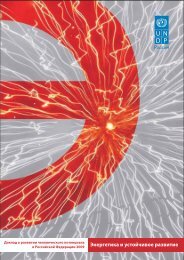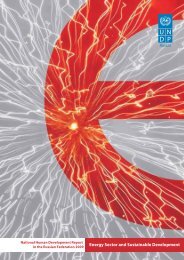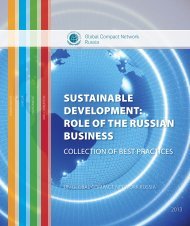Report - UNDP Russia
Report - UNDP Russia
Report - UNDP Russia
You also want an ePaper? Increase the reach of your titles
YUMPU automatically turns print PDFs into web optimized ePapers that Google loves.
subsidization practices in the regions 10showed that without subsidies people wouldstop paying for housing utilities and thesector would have to be financed directlyfrom the budget. Nevertheless, theprogramme has undergone constantmodifications, regional standards for cost ofservices have become increasingly varied,and rules for provision of subsidies havebecome increasingly strict, so that the scaleof subsidies has diminished in comparisonwith household expenditures. This can beseen from development of the averagesubsidy per family (Table 3.7). Since 2004there has been a reduction of budgetspending on housing subsidies for the poorand narrowing of the group of households,which are recipients. This has been obtainedmainly by raising the allowable share ofhousing utility expenses in householdbudgets to the federal standard of 22% ofaggregate family income, as well as byintroduction of flexible regional standards forhousing utility costs.Secondly, there is a system of benefits,now called ‘measures for social support withregard to payments for housing and communalservices’. These are a legacy of the Soviet era and,unlike subsidies, their recipients are defined byfalling under certain definitions (disability, etc.)and not on the basis of need. Previously thebenefits were provided as discounts on housingutility tariffs. The discount was 100% of housingutility costs for people meeting certaindefinitions, while others (the most numerousgroup) received 50% discount, and other groupsreceived less. Monetization of benefits, broughtin by Federal Law No.123 in 2005, had littleeffect on the housing utility benefit system:some regulations on provision were altered (e.g.non-extension to other family members) andFigure 3.7Coverage of social supportprogrammes relatedto housing utilities40,035,030,025,020,015,010,05,00,031,47,719,3 19,033,4 34,39,111,420,630,4 30,515,2Source: Calculations based on Rosstat data, Central Statistics Database,http://www.gks.ru/dbscripts/Cbsd/there was partial monetization in certainregions, which led to reduction of the numberof recipients (Figure 3.7).What is the outlook for social supportmeasures in the crisis context? As explainedabove, housing utility tariffs will continue togrow, so that larger amounts of social supportwill be necessary. The government isconsidering the possibility of giving federalsubsidy entitlement to households, whichspend over 15% of their income on housingutility, lowering the threshold from current22%. But preliminary studies show that such astep would require 300 billion rubles ofadditional funding, which is unaffordable forthe budget 11 . The threshold remainsunchanged to date, although regionalgovernments are free to set lower thresholds,covering the difference out of their ownbudgets. The system of housing utilitybenefits (‘measures for social support…’described above) will be monetized, so thatpeople who qualify for them will pay theirhousing utilities in full but will receivecompensatory cash payments. In general,26,319,5 20,3 19,513,711,927,7 27,510,621,2 20,72000 2001 2002 2003 2004 2005 2006 2007Share of households with members who receive housing utility benefits, %Share of people receiving housing utility benefits, %Share of families receiving subsidies, %8,810World Bank project, ‘Improvement of targeted social assistance programmes and employment support to fight poverty’, carriedout in 2006-2007 by specialists from the Institute for Urban Economics (Moscow), Independent Institute for Social Policy (Moscow),and the Urban Institute (USA) in five regions of the <strong>Russia</strong>n Federation: Tver, Tatarstan, Tomsk, Kalmykia and Karachaevo-Cherkessia.A.Ya.Burdyak, who worked on field studies in Tver and Kalmykia, analyzed the housing subsidies programme and efficiency ofadministrative spending.11Interview with the Minister for Regional Development, Victor Basargin, Rossiyskaya Gazeta, Federal Issue, April 28, 2009http://www.rg.ru/2009/04/28/basargin.html65












